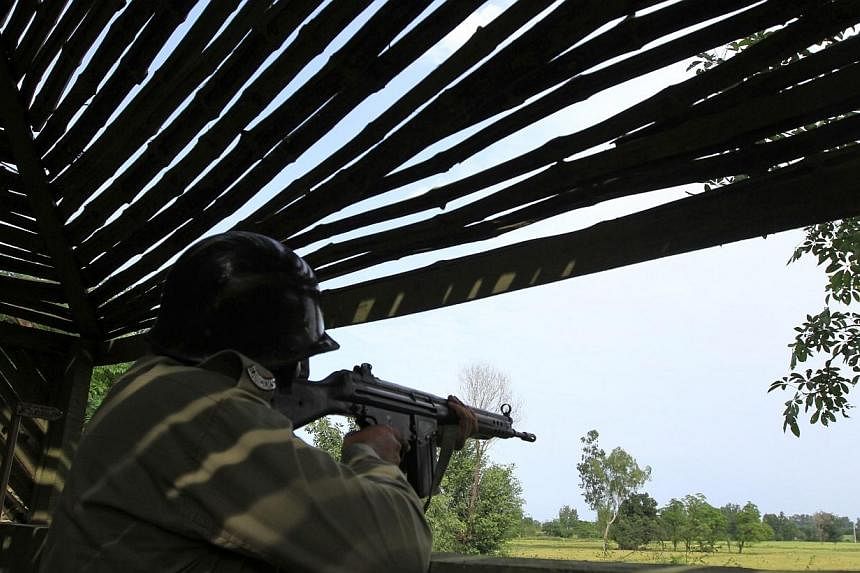ARNIA/NEW DELHI (Reuters) - India warned Pakistan it would pay an "unaffordable price" if it persisted with shelling and machine-gun fire across a heavily populated border area in the lowlands of Kashmir, raising the stakes in the rivals' worst fighting in more than a decade.
Pakistan responded that it was capable of responding "befittingly" to Indian actions on their disputed border.
"We do not want the situation on the borders of two nuclear neighbours to escalate into confrontation," the Defence Ministry said in a statement.
"India must demonstrate caution and behave with responsibility."
Nine Pakistani and eight Indian civilians have been killed since fighting erupted more than week ago along a 200km stretch of border in the disputed, mostly Muslim region of Kashmir. More were injured on Thursday.
Both of the nuclear-armed countries claim all of Kashmir's Himalayan mountains and fertile valleys, a major focus of tension in South Asia. They blame each other for starting the latest hostilities.
India's Defence Minister Arun Jaitley called Pakistan an"aggressor" and accused it of making unprovoked attacks on Indian-controlled Kashmir. He threatened heavy retaliation.
"If Pakistan persists with this adventurism then our forces will continue to fight," Jaitley told a news conference in New Delhi. "The cost of this adventurism will be unaffordable." He did not give more details.
Pakistan's Major General Khan Tahir Javed Khan, responsible for the section of the border where the violence has broken out, said that India had fired 20,000 shells so far this year, compared to just 200 in 2012.
He also said he had been trying to meet his Indian counterpart since the exchanges of fire began, but they would not return his calls.
This is the first major fighting with Pakistan that India's Prime Minister Narendra Modi has dealt with since winning an election in May. It comes after weeks of destabilising anti-government protests in Pakistan and just a few days ahead of Indian state elections, for which Modi has been campaigning.
While exchanges of sporadic fire are common along the de facto border dividing the region, the extent and intensity of the exchanges and the number of civilian deaths is unusual.
Since late on Wednesday, 13 people including three Indian border security guards were injured in firing from Pakistan, a senior Indian police official in Kashmir said.
India and Pakistan have fought two wars over Kashmir since they became independent in 1947. Their shared border is among the most heavily militarized in the world and travel between the two nations is kept to a minimum.
Each side accuses the other of targeting civilians and unprovoked violations of a border truce that has largely held since 2003.
Jaitley appeared to rule out initiating talks to end the heavy mortar fire that is falling on border posts and villages that have flourished on both sides in recent years thanks to the long lull in fighting. "How can we have talks when firing is on?" he said.
There was intermittent fire on Thursday.
India has for years accused Muslim Pakistan of backing separatist Muslim rebels in India's part of Kashmir. Pakistan denies arming the militants saying it only gives them diplomatic support in the face of human rights abuses by Indian forces.
Despite a reputation as a hawkish nationalist, Modi on Wednesday hinted that an end to the fighting could be in sight. "Everything will be fine soon," Modi told reporters after a meeting with the country's air chief. The terse sentence is all Modi has said publicly about the fighting.
Almost 20,000 Indian civilians have fled their homes in the lowlands around India's Jammu region to escape the fighting, taking refuge in schools and relief camps. "When will this stop?" said Ram Lal, 65, in Arnia, the village worst affected by shelling on the Indian side. Lal's wife had a bandaged arm after sustaining a small injury when two shells landed early on Thursday.
"We should have it out once and for all. What's the use of dying each day like this? Have a full-scale war and be done with it," Lal said, surveying walls pock-marked by shrapnel on his two-storey house. A nearby car had its windows shattered.
On the Pakistan side of the border, villagers moved among piles of debris from walls and roofs of their homes destroyed by mortar shells.
"The way Indian troops are indiscriminately shelling the civilian populations on our side, I am afraid there will be many more casualties," said Chaudhry Latif Akbar, a local Pakistani official in Kashmir.
India held a meeting on Wednesday of its top security officials to discuss how to handle the conflict. Pakistani Prime Minister Nawaz Sharif has called a similar meeting on Friday.
Despite Modi's suggestion of a quick resolution, there have been few moves to lower tensions.
Since the fighting broke out four days ago there has only been one telephone call between the two militaries. The usual way to stop clashes is to call a meeting of senior officials at the border, but no such meeting has been held this time.
One senior Indian army officer in Kashmir said the violence suited both sides, with Pakistan's army taking a more assertive role in politics and India's Modi fulfilling his promise of a more muscular foreign policy ahead of state elections.

